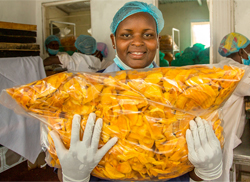
Adding value to mangoes by drying them created a new line of revenue for Mercy Mwende and her husband Mageria.
It seems like the middle of nowhere for first-time visitors. But Kamutiria village, deep inside Tharaka Nithi County, hosts a gem that is changing the lives and fortunes of mango farmers.
Sweet and Dried Enterprises is a multi-million-shilling agro-innovative value addition company founded by couple Mercy Mwende and her husband Mageria Migwi in 2009. But the dream of owning a processing company was conceived in 2006 by Mwende when she was a mango fruits broker.
She realised that most of the fruits went to waste when supply outstripped demand during peak seasons.
“Yet, during off-peak seasons, there were barely any fruits in the market,” she says.
Together with her husband, they invested Sh10,000 and registered the company three years later. The couple first constructed a makeshift drier, then bought raw materials.
From that humble beginning, Sweet and Dried Enterprises is now worth more than Sh20 million. A storeyed building has since replaced the makeshift structures.
“Your hands must be clean, your head and mouth should be covered,” Mwende says alluding to the strict hygiene policy she enforces around the processing zone.
The first stop when the mango arrives from the farm is the ripening chamber ,where the fruits are kept until they are hard-ripe. They are then weighed and taken to the washing sinks, where they are cleaned and rinsed under running water. They are then peeled and sliced.
“We are currently peeling and slicing manually, but we hope to get these two stages mechanised for speed and to reduce human-contact with the fruit,” Mwende says.
The juicy pieces of mangoes are then dried either by solar power or using an electric-powered machine. Solar takes about 12 hours while the electricity takes about four hours to dry the slices. The electric drier is mostly used during the wet season when sunlight is insufficient. The solar drier is made of wire mesh tables covered with plastic paper.
Sun heat-warms the plastic covers which in turn heats the inner chamber where mangoes are placed to dry. The drier has ventilation to ensure air circulation. The fruits are then packaged and labelled, ready for the market. It takes 20 kilogrammes of fresh mangoes to make a kilo of the dried product. Mercy’s main markets are supermarkets in Chuka, Nairobi, Meru and other parts of the country where she has distributors. Starting out with just a single employee, she now has 25 staff at the factory. The 31-year-old credits the growth to “determination, focus, and support from friends, relatives and well-wishers, who include governmental and non-governmental organisations”.
We are currently peeling and slicing manually, but we hope to get these two stages mechanised for speed and to reduce human-contact with the fruit.
She hopes to make the firm a leader in food processing, employing more than 250 workers in the next five years. The project has come as a relief to more than 500 farmers from Tharaka Nithi, Meru and Embu counties, who supply mangoes to the processor. Jane Muthoni, a Meru-based mango farmer says her mangos sold for Sh2 and Sh5 at the local Mitunguu market before she discovered the processor.
Alternatively, she would supply to brokers who would sometimes flee with her money after promising to pay once they sell the fruit.
“But I now supply to Sweet and Dried Enterprises, a piece of mango goes for between Sh10 and Sh15 depending on size,” she says.
Besides, she does not incur transport expenses as the company organises for the fruits to be picked up at her farm gate. Jane, who has a three-acre mango farm, says she used to earn about Sh250,000 annually from selling the fruits at the local market and to brokers.
She now makes an average of Sh500,000 from the same farm, being one of the main suppliers at Sweet and Dried Enterprises.
Besides, Jane says, she likes the fact that she accumulates her money and collects it in bulk, and is, therefore, able to budget. When mangoes are out of season, Sweet and Dried Enterprises processes other foods including pumpkin, carrot, dried ripe banana and raw banana flour. Tharaka Nithi County government hails efforts by Mercy to venture into value addition to horticultural products in the region.
“Young people do not have to go to the farm. Instead, let them concentrate on how they can use modern technology to earn a living through agriculture and also empower small-scale farmers economically,” says Jasper Nkanya, Tharaka Nithi County Executive Committee Member in charge of Agriculture, Livestock, Fisheries and Water.
He termed location of such a production firm at the heart of a village a “real rural development”, adding that the county will help the factory get connected to the national grid.
According to the CEO, one must obtain a licence from the county government, certification by the Kenya Bureau of Standards and the public health department. All employees must also get certificates of good health, which should be renewed every six months.
